Fendt
Fendt is a German agricultural machinery manufacturer founded in 1930 by Xaver Fendt in Marktoberdorf, Allgäu region, Germany. Fendt manufactures tractors, combine harvesters, balers, telescopic handlers and row crop planters. It was purchased by AGCO Corporation in 1997.
| Type | GmbH |
|---|---|
| Industry | Agricultural machinery |
| Founded | 1930 |
| Founder | Johann Georg Fendt |
| Headquarters | , |
Area served | Worldwide |
Key people | Walter Wagner, Christoph Gröblinghoff, Ingrid Bußjäger-Martin, Ekkehart Gläser |
| Products | Tractors Combine harvesters Balers Telescopic handlers Planters |
| Parent | AGCO |
| Website | www.fendt.com |
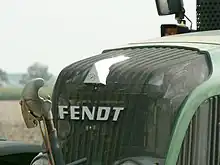
History

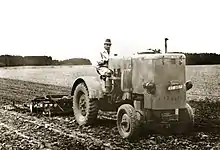
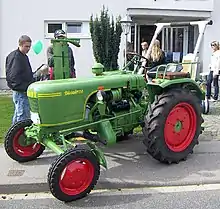
Company Origins and History up to 1950
The craftsman family Fendt traces its history back some 350 years. The family became well known in Allgäu for producing tower clocks, lead strings and violins.[1] The family also farmed as a sideline and had a small trade in agricultural equipment. Johann Georg Fendt, born on 16 August 1868, took over his father Franz Xaver's business in 1898 and began selling and servicing Deutz stationary engines.
Prior to 1928, Johann's oldest son, Xaver, was employed and gained industry experience working for Deutz and BMW while Hermann continued to help their father operate the family farm and the engine business.
In 1928, Xaver returned home and along with his brother Hermann and father Johann, the Fendt family branched out into agricultural utility machines by building a motorized grass mower.
_ret.jpg.webp)
The first 4.5 kW (6 hp) Dieselross tractor was built in 1930 by the brothers Hermann (1911–1995) and Xaver Fendt (1907–1989) under the guidance of their father Johann Georg Fendt (1868–1933).
In 1937, the company entered the Kempten (Allgäu) commercial register under the name "Xaver Fendt & Co., Maschinen- und Schlepperfabrik". Xaver and Hermann became shareholders while the mother Kreszentia acted as a limited partner.
In 1938, the Fendt brothers built the Dieselross F 22 with up to 16 kW (22 hp), followed by the Dieselross series until 1958, building the company's reputation over time.
In 1942, the company faced great challenges as the Nazi government enacted a prohibition of the construction of tractors with liquid fuel as a result of the shortage of raw materials. In response, Fendt designed the wood gas tractor Dieselross G25, which had a standard generator and Deutz unit gas engine. A total of 1,497 of these wood gas tractors would be produced between 1942 and 1949.[2]
In 1948, the Fendt brothers were able to regain control of the company when they were established as trustees by the US Military Government that was installed three years prior following the end of World War II.
1950s - 1970s
In 1950, production of the model F15 began, and the factory was producing 300 units per month. On 12 August 1950, the company produced its 10,000th tractor.[2]
1955 saw the company produce its 50,000th unit.[2]
In 1958, a new class of tractor series "ff" series with the types Favorit, Farmer and Fix were launched. The design was changed to offer engine power from 11 kW (15 hp) to 60 kW (80 hp). The Favorit 1 was trendsetting in transmission design and build.
1961 marked the year of the 100,000th tractor being produced; a model Fendt Farmer 2 that was adorned with a special golden coat of paint.[2]
1970s - Present Day
In 1970, Fendt created its first universal transporter loader wagon, the Agrobil S model. This year also marked the beginning of cabin production in Asbach-Bäumenheim, following the acquisition of Maschinenfabrik Josef Dechentreiter buiness unit there and the power of its 800 employees.[3]
In 1995, the company introduced its Vario Class, featuring innovative gearbox (transmission) technology, making it the world's first large tractor with the stepless continuously variable transmission.[4]
Since 1997,[4] Fendt has operated as wholly owned brand of AGCO Corporation and its agricultural equipment reaches a global market.
In 2009, the Fendt 200 series was offered for the first time with a Vario transmission which cemented Fendt as the first and only brand of tractor globally that featured a continuously variable transmission throughout its entire tractor lineup; 70-360 hp.[5][6]
In 2016, Fendt produced its 250,000th Vario transmission.[7][8]
In 2018, Fendt had the largest share in the European tractor market.[9] Fendt was the market leader by ownership in Germany with a share of 24.2% in 2018.[10] In the annual image barometer published by the DLG, in which German contractors and farmers are surveyed about agricultural engineering companies, Fendt took first place in 2013 with 99.3 out of a possible 100 points.[9]
CLIMMAR, an organization that publishes annual Dealer Satisfaction Index for nearly all Ag Equipment brands, has placed Fendt at an average measure of at least 14.1 in 8 of the last 10 years of survey (2011-2021) out of a maximum index of 15.[11] The company is a member of the VDMA, Department of Agricultural Engineering.[12]
As of 2022 Fendt showcases a product range that includes tractors, forage harvesters, combine harvesters, self-propelled sprayers, hay tools, row-crop planters, front end tractor loaders, and telescoping material handlers.
Product range


Fendt currently offers the following types of equipment:
- a range of tractors from 52–502 kW (70–673 hp), the majority of which are produced in Marktoberdorf, Bavaria, Germany,[13] and two models in Jackson, Minnesota, USA.
- A range of combine harvesters ranging from 160–590 kW (220–790 hp), are produced in Breganze, Italy,.[13]
- Forage equipment including forage wagons, tedders, mowers and rakes are badged under the Fendt brand after Fella was acquired by AGCO in 2011.[14]
- Large Square Balers formerly Hesston branded, are now marketed under the Fendt brand since being acquired by AGCO.
- Planters for placement of row-crops
Finishing up the product line are:
- Forage harvesters 466–634 kW (625–850 hp) which use Kemper headers
- Self-Propelled Sprayers
- tractor-mounted loaders
- telescoping material handlers or tele-handlers
- and tractors modified for the municipalities and forestry sectors.
Tractors
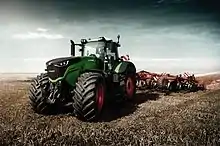
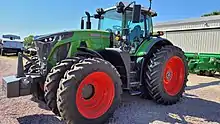
| Range | Power range (kW/hp) | Manufacturing Location |
|---|---|---|
| 200 Vario Series | 51–81 / 70–110 | Marktoberdorf, Germany |
| 300 Vario Series | 70–92 / 95–135 | Marktoberdorf, Germany |
| 500 Vario Series | 92–121 / 125–165 | Marktoberdorf, Germany |
| 700 Vario Gen 6 Series | 96–132 / 130–240 | Marktoberdorf, Germany |
| 700 Vario Gen 7 Series | 151–203 / 206–283[15] | Marktoberdorf, Germany |
| 800 Vario Series | 136–151 / 185–287 | Marktoberdorf, Germany |
| 900 Vario Series | 202–308 / 275 –420 | Marktoberdorf, Germany |
| 900 Vario MT Series | 283–321 / 380–430 | Jackson, Minnesota, USA |
| 1000 Vario Series | 279–368 / 380–517 | Marktoberdorf, Germany |
| 1100 Vario MT Series | 376-500 / 504-673 | Jackson, Minnesota, USA |
E100 Vario is a 75-kW / 100 hp. electric tractor. It can operate up to 10 hours under actual load.[16]
Combines
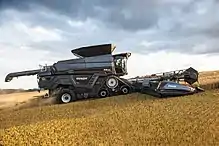
| Range | Power range | Thresher Type | Manufacturing Location |
|---|---|---|---|
| IDEAL | 336 kW / 451 hp
589 kW / 790 hp |
Single and Double Axial Rotor Design | Breganze, Italy |
| C-Series | 225 kW / 306 hp
265 kW / 360 hp |
Conventional Transverse Rotor | Breganze, Italy |
| L-Series | 179 kW / 243 hp
225 kW / 306 hp |
Conventional Transverse Rotor | Breganze, Italy |
| CORUS 500 | 136 kW / 185 hp
166 kW / 226 hp 192 kW / 260 hp |
Conventional Transverse Rotor | Breganze, Italy |
Large Square Balers
| Square Baler | Dimensions (cm/ft) | Manufacturing Location |
|---|---|---|
| 990 | 80 cm x 90 cm / 3 ft x 3 ft | Hesston, Kansas, USA |
| 1270 | 120 cm x 70 cm / 4 ft x 2 ft | Hesston, Kansas, USA |
| 1290 | 120 cm x 90 cm / 4 ft x 3 ft | Hesston, Kansas, USA |
| 1290 XD | 120 cm x 90 cm / 4 ft x 3 ft | Hesston, Kansas, USA |
| 12130 | 120 cm x 130 cm / 4 ft x 4 ft | Hesston, Kansas, USA |
Planters
| Range | Dimensions/Configuration | Manufacturing Location |
|---|---|---|
| Momentum 16 | 16 row 30 inch inter-row spacing | Beloit, Kansas, USA |
| Momentum 31 | 31 row 15 inch inter-row spacing
OR 16 row 30 inch inter-row spacing |
Beloit, Kansas, USA |
| Momentum 32 | 32 row 15 inch inter-row spacing
OR 16 row 30 inch inter-row spacing |
Beloit, Kansas, USA |
| Momentum 24 | 24 row 20 inch inter-row spacing | Beloit, Kansas, USA |
| Momentum 24 | 24 row 22 inch inter-row spacing | Beloit, Kansas, USA |
| Momentum 24 | 24 row 30 inch inter-row spacing | Beloit, Kansas, USA |
| Momentum 36 | 36 row 20 inch inter-row spacing | Beloit, Kansas, USA |
| Momentum 36 | 36 row 22 inch inter-row spacing | Beloit, Kansas, USA |
| Momentum 47 | 47 row 15 inch inter-row spacing
OR 24 row 30 inch inter-row spacing |
Beloit, Kansas, USA |
| Momentum 48 | 48 row 15 inch inter-row spacing
OR 24 row 30 inch inter-row spacing |
Beloit, Kansas, USA |
Forage Harvesters
| Fendt Katana | Power (KW/hp) | Manufacturing Location |
|---|---|---|
| 65 (2012-2019) | 460 kW / 625 hp | Hohenmölsen, Germany |
| 650 (2020–present) | 478 kW / 650 hp | Hohenmölsen, Germany |
| 85 (2012-2016) | 625 kW / 900 hp | Hohenmölsen, Germany |
| 850 (2022–present) | 632 kW / 847 hp[17] | Hohenmölsen, Germany |
Plant Protection Equipment
| Range | Power (KW/hp) | Nominal capacity (L/gal) | Liquid Boom widths (m/ft) | Manufacturing Location |
|---|---|---|---|---|
| RoGator 937/937H | 276 kW / 370 HP | 3411 - 4927 L / 900 - 1300 gal | 27.7 - 40.62 m / 90 –132 ft | Jackson, Minnesota, USA |
| RoGator 934/934H | 254 kW / 340 HP | 3411 - 4927 L / 900 - 1300 gal | 27.7 - 40.62 m / 90 –132 ft | Jackson, Minnesota, USA |
| RoGator 932 | 239 kW / 320 HP | 3411 - 4927 L / 900 - 1300 gal | 27.7 - 40.62 m / 90 –132 ft | Jackson, Minnesota, USA |
| 600 | 125-167 kW / 170-227 HP | 3850 - 6000 L / 1015 - 1583 gal | 24 – 36 m / 78 – 117 ft | Hohenmölsen, Germany |
| 300 | - | 3500 - 6930 L / 924 - 1829 gal | 24 – 30 m / 78 - 97.5 ft | Hohenmölsen, Germany |
Material Handling Equipment
| Range | Model | Continuous Lift Capacity
(daN/lb-force) |
Compatible Tractor Model | Manufacturing Location |
|---|---|---|---|---|
| Fendt Cargo Loaders (for tractors) | Cargo 3X/65 | 1680 daN / 3775 lb-force | Fendt 200[18] | Marktoberdorf, Bavaria, Germany[19] |
| Cargo 3X/70 | 2000 daN / 4495 lb-force | Fendt 300[18] | Marktoberdorf, Bavaria, Germany | |
| Cargo 4X/75 | 1940 daN / 4360 lb-force | Fendt 300 and Fendt 500[18] | Marktoberdorf, Bavaria, Germany | |
| Cargo 4X/80 | 2260 daN / 5080 lb-force | Fendt 500[18] | Marktoberdorf, Bavaria, Germany | |
| Cargo 4X/85 | 2600 daN / 5845 lb-force | Fendt 700[18] | Marktoberdorf, Bavaria, Germany | |
| Cargo 5X/85 | 2600 daN / 5845 lb-force | Fendt 700[18] | Marktoberdorf, Bavaria, Germany | |
| Cargo 5X/90 | 2950 daN / 6630 lb-force | Fendt 700[18] | Marktoberdorf, Bavaria, Germany | |
| Cargo Pro 6.100 | 4070 daN / 9119 lb-force | Fendt 700 Gen 7 | Marktoberdorf, Bavaria, Germany | |
| Fendt Cargo Telehandler | T740 | 6500 daN / 14610 lb-force | n/a | Straubing, Bavaria, Germany |
| Fendt Cargo Telehandler | T955 | 8500 daN / 19100 lb-force | n/a | Straubing, Bavaria, Germany |
Technology
Vario Transmission
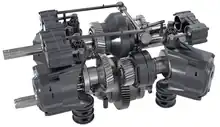
The Vario transmission[21] was first developed in the 1970s, but due to excessive noise of the hydraulic portion of the transmission and lack of engineering production methods that had not yet been invented, it was not seen on a production tractor until 1995, when Fendt launched the revolutionary Fendt 926 Vario. This was the first ever stepless transmission to be launched in the tractor market, and is patented to be the only truly stepless transmission when it was first developed.[22][23][24][25][26][27] Competitors were unable to make a transmission as advanced as a Fendt Vario at the time with a hydrostatic transmission as the only real competition, however, these soon fell out of favor. Since its initial announcement and release, manufacturers such as ZF, John Deere and CNH group have also developed their own versions of this type of transmission.
Fendt's infinitely variable transmission (IVT) differs from a continuously variable transmission (CVT) as an IVT can be traveling at 0.0 km/h whilst the transmission is engaged and not in neutral. The IVT/CVT gearbox is widely regarded as one of the most fuel-efficient gearbox types on the agricultural market[28] prompting nearly all other major manufacturers to develop their own system as it is able to combine more precise ground speed selection by the user with an increase in fuel-efficiency.[29]
Variations can be found on other AGCO tractor brands such as Massey Ferguson. The gearbox may be the same however the individual brands have different controls/ joysticks and may have different ECU software.
The first generation of Vario transmissions were named for their primary inventor, Hans Marschall and the different classes of the transmission were labeled in honor of him using the format of "MLxxx" where the x characters would indicate how many kilowatts of power could be transferred through the transmission. (i.e. the original Fendt 926 Favorit Vario featured an ML200 Vario Transmission which could transfer 200 kW or 268 maximum horsepower through it)
Tractor Management System
In 2004, following the paradigm-shift of the Vario transmission, the next large innovation that Fendt delivered was the ability for the tractor gearbox/transmission and the engine to communicate with one another based on parameters set by the operator that allowed the machine to command only as much engine power as needed to complete the commanded task; a concept that was branded as Vario TMS or Tractor Management System.
VarioGrip
Fendt pioneered the idea and implementation of the first tire pressure monitoring and control system for use on an agricultural tractor. It was developed in the late 1980s[30] and first released in an open-loop feedback system offering in 2015 on the Fendt 800, 900, and 1000 Vario Series tractors.[31][32]
Fendt iD Low Engine Speed Concept
Beginning with the 1000 series tractor in 2015, Fendt created and implemented the use of the low engine speed concept which was also a world-first for any size agricultural tractor. While most diesel tractor engines operate at a rated engine RPM of 2000-2300, Fendt engineered the machine to work at its optimum between 1100 and 1500 RPM with a max RPM of 1730. The results from this innovation resulted in lower fluid consumption, longer service intervals, and longer overall machine life due to less component wear.[33] With the success of Fendt iD on the 1000 series, it is also now utilized on the 900 Vario Gen 6 and newer series, the 900 Vario MT series, the 1100 Vario MT series, and the 700 Vario Gen 7 and newer series.
The Trisix
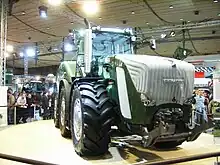
Fendt released a prototype of a new concept tractor at Agritechnica 2007, in Hanover, Germany, called the TriSix nicknamed "Mobydick" and boasting 400 kW (540 hp) and six-wheel drive.
The front axle and the rearmost steer the tractor, and as the speed of the tractor increases, the amount of steering input on the rear axle reduces to make it safer. It also completely locks out when in transport mode and with some implements.
To handle the horsepower the Trisix has two of the company's trademark Vario transmissions, which push the machine up to a top speed of 60 km/h (38 mph). Fendt has not confirmed the production of this machine, and it remains in the prototype stage. The axles and backbone tube are from Tatra 815 series trucks and the 6x6 Tatra-based tractor concept was patented in 1997 by Farma Josef Dvorak of Tábor, Czech Republic.
Appearances in media
A Fendt 930 Vario was shown on BBC's Top Gear, where host James May chose a 930 Vario.[34] It was driven by The Stig round the Top Gear Test Track, and did a time of 3:28.4, the second slowest time round the track. The Fendt 930 Vario does however report a top speed of 37.5 mph, much faster compared to similar competitor's tractors.
The Fendt 716 also appeared on BBC1 Scotland, on the program Countryfile, where world-class Fendt Driver, Steven Brown, of Inverdovat Farm, won the annual Scottish Fendt Ploughing Match, receiving a prize of £5,000.
Fendt tractors have appeared in the widely-popular Farming Simulator 2008, Farming Simulator 2009, Farming Simulator 17, Farming Simulator 19 and Farming Simulator 22 games.
See also
- Deutz-Fahr
- Fendt Caravan (formerly a part of Fendt)
- Hanomag
- Monarch Tractor
References
- "Farm machinery giants: The Fendt success story". Farmers Weekly. 20 December 2016. Retrieved 31 July 2022.
- "Fendt :: Die Traktorenbauer". www.fendt.de. Retrieved 6 August 2023.
- "Dechentreiter". www.landtechnik-historisch.de. Retrieved 6 August 2023.
- "Fendt – its origin, story and vision". www.farminglife.com. 10 April 2019. Retrieved 31 July 2022.
- "Vario-Getriebe in allen Fendt-Traktoren - Agrarheute". 10 September 2014. Archived from the original on 10 September 2014. Retrieved 6 August 2023.
- "100,000 Vario up to now – 100 percent Vario starting now". www.pitchcare.com. 22 October 2009. Retrieved 6 August 2023.
- Finnerty, Conor (1 December 2016). "250,000th Fendt Vario transmission has just rolled off the production line". Agriland.co.uk. Retrieved 31 July 2022.
- "161128 - 250.000 Variogetriebe - 01 | 2016 | News Center | Fendt World". www.fendt.com. Retrieved 31 July 2022.
- "European Dealer Satisfaction Barometer - Fendt". www.fendt.com. Retrieved 1 July 2021.
- "AGCO/Fendt continues to grow - Fendt". www.fendt.com. Retrieved 1 July 2021.
- "Activities - CLIMMAR". www.climmar.com. Retrieved 31 July 2022.
- "Fendt History". AGCO Corp GmbH. Retrieved 26 October 2012.
- "Where Are Fendt Tractors And Combines Made? | Equipment Radar". www.equipmentradar.com. Retrieved 31 July 2022.
- "New energy to harvesting AGCO Feucht". issuu. Retrieved 31 July 2022.
- "AGCO's Fendt 700 Vario Gen 7 Tractor Features New Engine, Transmission". DTN Progressive Farmer. Retrieved 2 September 2022.
- Gaines, Tharran (28 November 2021). "An electric tractor may be in your future". Successful Farming. Retrieved 23 July 2022.
- MarketScreener. "AGCO : Launch of the New Fendt Katana 850 | MarketScreener". www.marketscreener.com. Retrieved 2 September 2022.
- Equipment variants and technical details fendt.com Retrieved 10 May 2023
- "Loaders: Where are they made?". Farmers Weekly. 23 June 2021. Retrieved 3 August 2022.
- US10661800B2, STAEDELE, Alexander & Geiger, Markus, "Agricultural vehicle driveline", issued 2020-05-26
- EP0562594A1, Heindl, Richard, "Antrieb für zweiachsige land- und/oder bauwirtschaftlich nutzbare Fahrzeuge", issued 1993-09-29
- EP0418881A1, Marschall, Hans & Heindl, Richard, "Abdichtung für Kolben in Axialkolbenmaschinen", issued 1991-03-27
- DE3936812A1, Heindl, Richard & Marschall, Hans, "Axialkolbenmaschine in schraegachsenbauweise", issued 1991-05-08
- DE2335629A1, Marschall, Hans, "Antriebsvorrichtung, insbesondere fuer land- und bauwirtschaftlich genutzte fahrzeuge", issued 1975-01-30
- DE4022049A1, Nett, Hans-Peter; Honzek, Robert & Heindl, Richard et al., "Schallabstrahlungsgedaempfte lagerung eines antriebsaggregates", issued 1992-01-16
- DE1286913B, Georg, Heidemann; Hans, Marschall & Joerg, Senger et al., "Steuereinrichtung zum Verstellen des Primaer- und/oder Sekundaerteiles eines hydrostatischen Wandlers zum Antrieb von Kraftfahrzeugen", issued 1969-01-09
- DE2335629A1, Marschall, Hans, "Antriebsvorrichtung, insbesondere fuer land- und bauwirtschaftlich genutzte fahrzeuge", issued 1975-01-30
- Ji, Jian; He, BoZhou; Yuan, Lei (8 October 2017). "A Comparative Study on Fuel Economy for CVT and 9-speed AT based Vehicles". SAE Technical Paper Series. Vol. 1. Warrendale, PA. doi:10.4271/2017-01-2435.
{{cite book}}: CS1 maint: location missing publisher (link) - "Understanding CVT and powershift transmissions when buying a tractor". Farmers Weekly. 25 September 2019. Retrieved 31 July 2022.
- FR2648085B3, Brock, Thomas & Rathke, Gerd, "Vehicule utilitaire notamment tracteur agricole a pneumatiques et installation de controle et de changement de la pression des pneumatiques pendant le deplacement", issued 1991-05-31
- US9045129B2, Brenninger, Martin, "Engine control system", issued 2015-06-02
- "History". www.fendt.com. Retrieved 6 August 2022.
- "Fendt introduces new high-horsepower tractors with low engine speed concept". OEM Off-Highway. 2 December 2015. Retrieved 2 September 2022.
- "Episode 5, Series 9, Top Gear - BBC Two". Retrieved 24 February 2017.